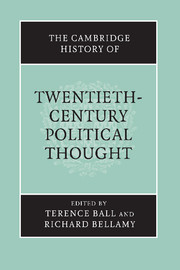Book contents
- Frontmatter
- Editors’ introduction
- Part I The changing fortunes of liberal democracy
- Part II Varieties of Marxism
- Part III Science, modernism and politics
- Part IV New social movements and the politics of difference
- Part V Beyond Western political thought
- 26 Non-Western political thought
- 27 Islamic political thought
- 28 Epilogue: The grand dichotomy of the twentieth century
- Biographies
- Bibliography
- Subject index
- Name index
- References
26 - Non-Western political thought
from Part V - Beyond Western political thought
Published online by Cambridge University Press: 28 March 2008
- Frontmatter
- Editors’ introduction
- Part I The changing fortunes of liberal democracy
- Part II Varieties of Marxism
- Part III Science, modernism and politics
- Part IV New social movements and the politics of difference
- Part V Beyond Western political thought
- 26 Non-Western political thought
- 27 Islamic political thought
- 28 Epilogue: The grand dichotomy of the twentieth century
- Biographies
- Bibliography
- Subject index
- Name index
- References
Summary
Four points of clarification are needed about the theme of this chapter and the title itself. First, from a non-Western perspective the twentieth century could be said to begin in 1905 when Japan defeated Russia, an event that destroyed the widespread myth of European invincibility and was celebrated by millions from China to Peru, or in 1918 when the savagery of the First World War, or what non-Europeans call a European civil war, shook their lingering belief in the cultural superiority of Europe. From a non-Western perspective, the twentieth century has not yet ended and would only do so when their agenda of cultural and economic decolonisation is completed and full equality with the West is attained. Since the beginning and the end of the twentieth century are matters of historical judgement and hence contestable, I have taken the safer route of defining it in strictly chronological terms.
Second, the lives of non-Western political thinkers do not all fall neatly within the twentieth century. Some of them continued to live well into the twentieth century but published nothing or little of substance after 1900. I ignore such writers and concentrate on those who published most or at least some of their major works in the twentieth century and participated in its intellectual life.
- Type
- Chapter
- Information
- The Cambridge History of Twentieth-Century Political Thought , pp. 551 - 578Publisher: Cambridge University PressPrint publication year: 2003
References
- 2
- Cited by

